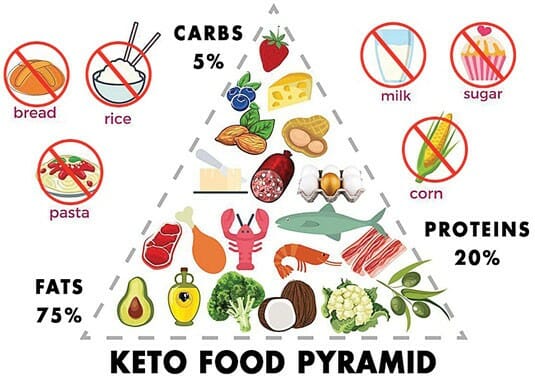How Long Does It Take To Get Out Of Ketosis
How Long Does it Take to Get Out of Ketosis After Eating Carbs?
According to Experts, when the body receives less than 50 grams of carbohydrates per day, it will be depleted of its preferred fuel source — glucose — and this typically happens 3 to 4 days after the beginning of the diet but can vary from person to person.
Keep reading to learn how you can use this information to burn more fat
What is Ketosis?
Maybe you or someone you know has done the "keto diet". At the very least, you are probably familiar with the term "ketosis".
You may know people who follow a ketogenic lifestyle and have lost lots of weight. But do you know what's actually happening in your body that causes you to be in a state of ketosis?
Ketosis happens in 2 ways:
- Your liver begins to produce ketone bodies (which are acids in your bloodstream)
- Then your body must rely on them for fuel (1)
3 Other biological adaptations take place as well:
- Your glycogen stores decrease,
- Your insulin levels are reduced
- You breakdown fat for energy.
Want the inside scoop on "What is Keto?" Check out this video from Dr. Christopher Shade:
Getting Into Ketosis
When trying to maintain a state of ketosis in your body, it's important to understand the macronutrient balance that will keep you there – usually:
- 5% carbohydrate,
- 20% protein
- 75% fat.

Keto Food Pyramid breaks down how the Keto Diet Works
It doesn't take long for the body to reach the ketogenic state.
When the body receives less than 50 grams of carbohydrates per day, it will be depleted of its preferred fuel source — glucose — and this typically happens 3 to 4 days after the beginning of the diet but can vary from person to person. At this point, the body will start to break down protein and fat for energy.
Your body begins to use ketones as its main fuel source. These are compounds are the result of breaking down fat. This metabolic process is known as "ketosis" and can have many benefits.
Now, your body is starting to become "fat-adapted" which doesn't always mean you are in ketosis. You can achieve fat adaptation without being in ketosis. The way this difference is measured is through exercise. Your body will burn through significant amounts of fat and it will conserve carbohydrates.
However, much of the benefits to being in ketosis are the result of fat adaptation. Those benefits include:
1. Weight Loss
This is typically the number one reason people decide to try a keto diet. The more your body can use fat for fuel, the more you will see a weight loss effect.
2. Satiety
Keto helps you stay full longer which means less snacking between meals (and potentially more weight loss)!
3. Improved Exercise Performance
Again, with fat being your main source of fuel in ketosis, you will be able to store more energy. This one is a bit controversial in terms of athletic performance as there are different schools of thought behind the process. Simply put, your body can store more energy in fat than in glycogen.
Ketosis & Fat Adaptation
Ketosis is tricky because it can be transient. When you begin the diet, you produce a lot of ketones. Then as your body becomes fat-adapted, it gets acclimated (i.e., fat-adapted) and your levels can decrease.
This is because your muscles learn to run on free fatty acids instead of ketones. But diet isn't the only factor in falling out of ketosis. You can exercise your way out or stress yourself out.
Since insulin is produced when you are under physical and emotional stress, this can lead to lower ketone levels. But after reintroducing those carbs to your diet, your body will begin to quickly recognize it is no longer in ketosis. This will vary from person to person depending on activity level, age, and how long you have been fat adapted.
It can happen almost immediately or it can take a few hours. Once you ingest carbohydrates – in any form – sugary snacks, bread or soda, those carbs hit your system, and blood glucose levels rise. Your body will begin to use them as its preferred fuel source.
It doesn't really matter how much you eat either. So if you're thinking about "cheating" with one small bite of cake, you can be kicked right out of the keto club! And there's nothing wrong with that.
You can either jump back in quickly and easily or you can take an extended break. Keep in mind, you will be starting all over again after a break of more than 24 hours. Once your body is in the "fed" state, your ketone production has ceased.
The carbs you take in will stop ketones from being produced until they are used up or stored away in your muscles. You will stay out of ketosis until you start your regimen again. If you don't get your macronutrient ratios back on (the fat) track, you may go through an unpleasant adjustment period.
To get a doctor's perspective on how many carbs you can really eat on Keto, check out this video from Dr. Christopher Shade:
Negative Effects of Going Out of Ketosis
When you break out of ketosis your body may experience some side effects. Initially, you may not feel very well. You may experience "keto flu" symptoms (which you may have had when you first started).
Your individual metabolism will play a role as well as what kind of keto break you took. Although these effects may not happen for everyone, here are a few negatives to be aware of:
1. Fatigue
Remember the highs and lows when carbs were a part of your regular diet? Well, here they are again. That spike/crash cycle will cause insulin levels to fluctuate leading to low blood sugar and exhaustion.
2. Carb Cravings
Insulin spikes force energy into your cells. Depending on how insulin-resistant your body is, it can leave other cells in a starved state.
What do starved cells crave more of? Carbs.
3. Brain Fog
Ketones are your brain's preferred source of fuel. Once you are back on glucose, you may experience some fogginess in your head.
4. Mood Swings
You are re-regulating your hormones which can cause changes in mood.
5. Nausea
By introducing previously restricted food, your body needs to readjust which could cause you to feel nauseous.
Regaining the Benefits
The good news is that once you restrict carbohydrates again, it should take about 12-24 hours to get back into ketosis depending on how extreme your previous diet was (2).
If you were maximally restricting carbs and then you suddenly re-introduced them, it could take longer to get your body re-adjusted. Remember, your body stores glycogen in your muscles and the more storage you have, the longer it will take to burn through it.
Accelerating the Process Naturally
If you need some assistance in speeding up the process of ketosis, you may want to consider a supplement.
While there is no complete substitute for the effects of following a ketogenic diet, there are certain nutrients and plant compounds that have been shown to maximize your results.
One particular study revealed that Diindolylmethane (DIM), Resveratrol, and Quercetin are played an important role in encouraging the body to use fat for fuel. These 3 natural compounds may provide help increase energy levels, promote weight loss, and even improve cognitive function.
The Right Choice
Quicksilver Scientific Keto Before 6 combines:
- Diindolylmethane (DIM)
- Resveratrol
- Quercetin with other natural compounds like Milk Thistle, Berberine HCL, and Cinnamon bark extract.
This unique blend has been created to help the body enter into a state of ketosis as quickly and naturally as possible. Quicksilver Scientific Keto 6 has undergone rigorous in-house testing and has proven very effective. Quicksilver Scientific also kicks in faster and more efficiently to produce results in just a few days.
You can easily add this supplement to your existing ketogenic diet if you are looking for more flexibility or just need that extra boost. Quicksilver Scientific has a high rate of absorption while protecting vital nutrients from degrading in the gastrointestinal tract.
Available in 100 mL (20 servings) or 500 mL (100 servings) bottles, Click Here to check it out on our website!

Click Here to see Keto Before 6 on our Website!
Thank you for taking the time to read How Long Does it Take to Get Out of Ketosis After Eating Carbs?.
Your success is our passion. If you have any questions or contributions, please contact us via email or phone call. We are constantly looking for new information to promote wellness – and hearing from you would make our day! Feel free to reach out to our free Health and Wellness Consultation headed by our Certified Health Consultant, Kurt LaCapruccia, D.S.S. (Diploma in Dietary Supplement Science).
Live Vibrantly! – DR Vitamin Solutions
How Long Does It Take To Get Out Of Ketosis
Source: https://www.drvitaminsolutions.com/blog/how-long-does-it-take-to-get-out-of-ketosis-after-eating-carbs/
Posted by: mendessadamess.blogspot.com

0 Response to "How Long Does It Take To Get Out Of Ketosis"
Post a Comment